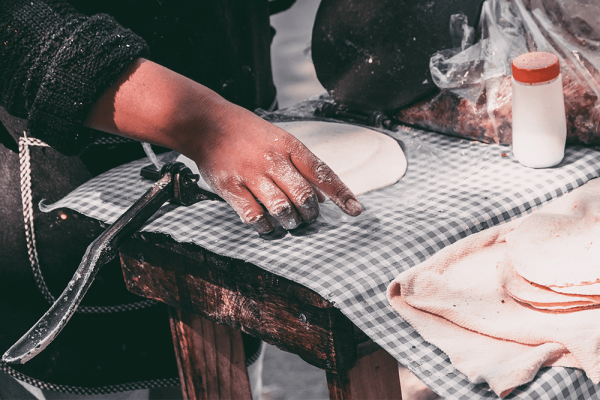To think of grandma is to think of a persistent presence of love.
“¿Que pasa abuela? ” I’d say to her, always with an insecure grin. She’d shake her head. “You know I don’t like you calling me that, ‘abuela.’” Then she’d laugh. And with a gentle voice, she’d remind me, “I love you mijo.”
There is an assurance to her statement, built by 25 years of consistent action. I remember, during my grandma’s visits, waking up every morning to her cooking chorizo and eggs, beans and eggs, bacon and eggs. She’d spend hours making tortillas for my family. Even now, she makes tortillas en masse, her ancient hands folding flour and water into dough, rolling that dough into disks, and tossing them on the comal until tortillas sizzle into being.
When my parents fought and my father left for the Philippines and my mom felt defeated and the family seemed to fracture, it was grandma who brought me comfort. She’d ask me if she could make me something to eat, or she would sit with me just to be present; our shared silence represented a somber solidarity. Even now, when I see her, she swaddles me in her arms and says, “Grandma loves you.” She did this when I was a child and she hasn’t stopped now that I’m an adult. Only now, she cries when she says it.
I wonder about her tears, words, and actions. From where does the intensity of her love come? Why does she remind me that love is the impulse behind all she does for me? Of course, I know what she’d tell me. God empowers her love. I’ve heard her say this before, and the last time I asked her about God, she emphasized it again. She loves because of God’s presence in her life.
But this answer haunts me — if only because divine absence has been as real to me as grandma’s presence. She once told me that when she was a kid she fell into a ditch filled with water, but she said, “the Lord pick me up,” keeping her above water until her cousin and her grandma Petra, came to help.
Grandma possesses a Pentecostal confidence in God. In contrast, I wrestle with an incurable doubt, the one thing holding me back from atheism being the devastating possibility that the center of my writing, vocation, and life is but a delusion. This contrast is impossible to ignore.
But my grandma is not alone in this confidence. Among the Pentecostals with whom I grew up, speaking in tongues was a “gift” of being baptized in the Holy Spirit — a phenomenon in which a person enters an ecstatic state, believing themselves to be overcome by God.
As a little boy, I once remember an elder of the church crying out and uttering prophecy after prophecy, predicting the church’s future. And there I was trembling in awe before the miraculous. And the man spoke as though he were God. And we children were enraptured by the presence within his body — the man was lost in a divine consumption; he disappeared before the whirlwind of prophetic utterances that were being sung from his mouth.
I remember standing in the sanctuary, staring with utter curiosity and wondering what it might look like to be so intimately acquainted with God. Could that ever be me?
Honestly, it’s never been. I remember crying to God for this same gift. I think what I really wanted was the assurance that I was crying out to someone. Silence.
I’ve never felt the certainty of divine presence in my life. I’ve chased it, I’ve wanted it, but I have never felt it. My religious experience is more akin to poet and essayist Christian Wiman’s experience. Wiman describes God as “... my bright abyss / Into which all my longing will not go.” I persistently feel my attempts to address God are met with emptiness, and yet I find it impossible to abandon the language of religion. What do I do about this “bright abyss” that I seek but never find? What do I make of this divine glow on the horizon of my experience that all but fades away when I seek it?
This absence is all the more alienating when I hear the trust and confidence of grandma’s testimony. Jesus, she once told me, was her everything. Her “el salvador.” In times of need and of uncertainty. I believed her. She grew up as a migrant farmer wandering the United States with my grandpa, desperately in search of work, poor and viewed as “other” in the country they called home. She knows the precarity of existence and lived a life far from material blessing. I can’t help but describe these conditions as godless. But despite this past, she trusts God. Even when grandpa died, she did not cease to believe in God. Instead, she brought questions to God: “Why did you take him away?” When she’d ask this, I could see grief — but not doubt — on her face. Though she grieved grandpa’s absence, death did not overwhelm her belief in God’s presence.
In this same conversation, grandma told me that God was love and that God enabled her to overcome anger and fill her with a love for others. “What does the Bible say?” She asked. “You cannot love yourself unless you love your neighbor.” Love, she thought, emerged outside of herself. She told me she loved her kids and other people because of the power of God. “Look at us,” she remarked, drawing attention to the fact that I sat with her and my mom in the kitchen while we talked about God. “It’s so beautiful. It’s so precious. My God, my God, he changed me for everything.” Presence against absence; unmet longing against unshakeable confidence; contradicting experiences of the same reality.
The clash of these experiences reminds me of Gloria Anzaldúa’s book Borderlands, La Frontera: The New Mestiza, where she uses the borderlands of Texas and Mexico as a site for reflection on being human. Like the borderlands, to be human is to inhabit a space where multiple cultures, peoples, and places meet and fold into one another.
Anzaldúa is specifically interested in interrogating the social location of mestiza-identifying women. But I think her insights can also apply more generally to anyone looking to “cope” with this multiplicity, as they search for ways to develop “a tolerance for contradictions, a tolerance for ambiguity.” Anzaldúa is not a theologian, but her observations about multiplicity and contradictions strike me as theologically significant. Perhaps we can have a multiplicity of experiences of not just the world that unfolds before us, but of God. And if “borders” between humans are not so stable, but rather porous, perhaps the same is true of that “border” between God and humans. To use Anzaldúa’s language of “borderland,” everyday life is a creature-Creator borderland, in which transcendence can hide within the most quotidian of nonreligious experiences. Or, as theologian Mayra Rivera puts it in A Touch of Transcendence: A Postcolonial Theology of God, perhaps God is present like the “sap” within a tree, remaining distinct from creation while also being enmeshed within it.
Perhaps this is implicit in grandma’s love: The love I received is God’s love enacted through her. Her act is not hers alone — it also belongs to the God who empowers her. God was present to me through the persistent presence of my grandma: through her worldly acts of cooking me food, giving me a hug, and calling me mijo. My world, it turned out, isn’t as absent of God as I thought. One finds God in receiving the concrete love of others. I don’t need God to be experienced as an ecstatic presence, for God’s presence is discovered not within, but without: in abuela’s laugh, in her tortillas, in her hugs, in her presence when my family fell apart. I have never possessed God, not like grandma. And yet it seems impossible to deny that in receiving her love, I dwell on the border between creatures and the divine.
Got something to say about what you're reading? We value your feedback!






